
The new house is turquoise.
“I’d call it more of a … blue-green,” Mom says, tilting her head like maybe that would change the color.
“Teal,” Dad offers. “It used to be a very popular color for exteriors.”
Dad knows nothing about exteriors, or colors for that matter. That’s the thing about newspaper editors, though. They can sound like experts on just about anything.
“Wasn’t it white in the pictures?” Mom asks.
The moving truck rumbles up the otherwise quiet street called—I swear to the Aliens—Friendly Court, then the driver leans out the window.
“This one yours? The turquoise one?”
Mom drops her head. “I give up.”
Dad nods to the driver. “The turquoise one.”
The truck reverses and backs into the driveway, and just like that, we’re Jay, Luanne, and Nicky Roth, of 909 Friendly Court, Raven Brooks. This fall I’ll be an eighth grader at Raven Brooks Middle School, where I’ll excel in science and English and struggle in math and Spanish. I’ll be that short kid in the Beatles T-shirt, whom everyone mistakenly calls “Nate,” with the brown hair that sticks up on the left side no matter how much water I use to flatten it. I’ll eat Jell-O pudding packs every day and clear the lunch table because there’s no reason why I shouldn’t, and I’ll spend the rest of the lunch period taking things apart and putting them back together.
“It’s a nice street,” Dad says of the mostly pristine lawns and neatly shuttered windows. The paint is a little faded, the cars are a little old, but we’ve lived on worse blocks, and I even see a cat or two crouched in flower beds across the street. Cats feel like a good sign.
“It’s quiet,” Mom says, and it’s hard to tell if that’s praise or worry in her voice.
“There’s a llama farm,” I say, and my parents look at me. “I saw a sign,” I explain, and then we’re quiet again.
“Well,” Dad says after a while, “I think I’ve earned a Ho Ho.”
Mom’s always complaining that Dad never lost his childhood sweet tooth, but there’s a grown-up method to his sugar madness. Once you figure out the pattern, it’s pretty easy to tell how Dad’s feeling. Ho Hos mean he’s exhausted. Ding Dongs are the treat of choice for when he’s happy. Pounding down Suzy Q’s? It’s time to celebrate! But the real telltale cakes are the yellow ones. Zingers can mean only one thing—Dad’s sad. Twinkies are for when he’s pondering life’s big questions—big Alien-Overlord-in-the-Sky questions.
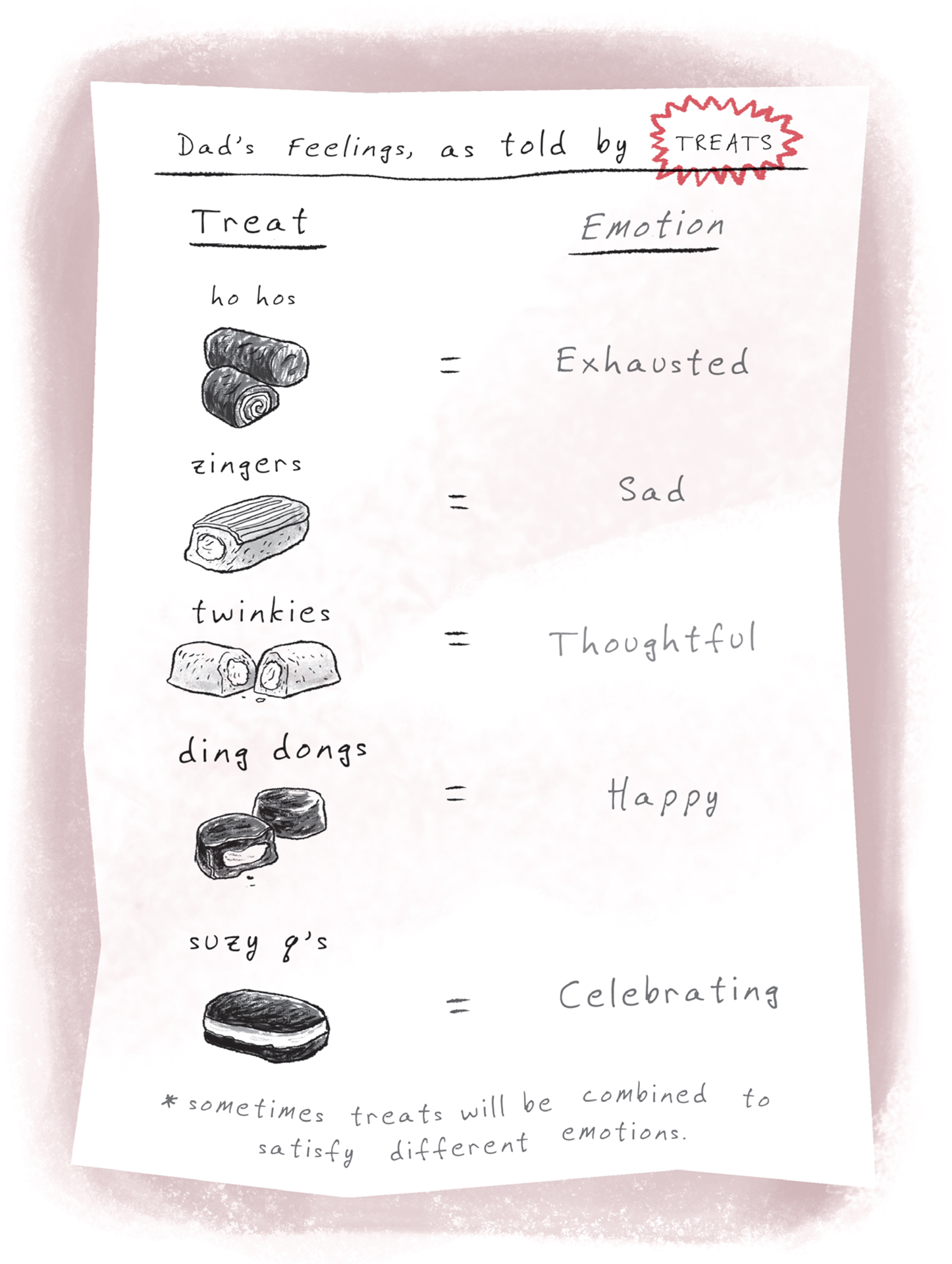
Mom sighs. “Jay, you’ve had three already.”
“What’s that, dear? I can’t hear you. It’s Ho Ho’clock!”
I start to follow them into the house but decide to take in the quiet of the street a little bit longer. Maybe if I hang out long enough, one of the cats will come over. I take a seat on the curb in front of our new turquoise house and pull the long blades of grass that shoot up on either side of me. I’m lost in thoughts of my latest project—a knot of old padlocks I found in an empty lot by the red house. Five different padlocks, all interlocked with no keys. I’ve managed to pick two of them, but the other three are giving me trouble. Locks are my new project, specifically lockpicking. It feels like I’m taking something apart without actually deconstructing it, like I’m discovering the secret from the inside out. I tried to explain it to Mom once, but I don’t think she understood; she’s more into stuff you can see under a microscope.
“I think you’re amazing, Nicky,” she’d said, then tilted my chin up to meet her stern gaze. “Just use your powers for good.”
That’s the warning she attaches to pretty much everything I do, a reminder that even the smartest people can make dumb decisions.
Movement from across the street breaks my trance, and at first I think it’s one of the cats, but I don’t see them anymore. All I see is a curtain billow on the second story of the house across the street. I stare harder, but I can’t see whoever moved the curtain. All I see is the reflection of a twisted oak tree that practically touches the window, it looms so close. Someone was watching me, though. That’s a feeling you just know, like when the air smells different before a storm. I watch the window for a little bit longer until I get sick of waiting.
“Stare at me all you want,” I tell the empty window. “Nothing to see here.”
I stand to go inside, already folding on my decision not to unpack. Maybe just the box with the padlocks, I think. Then I hear a tiny mewing sound behind me—one of those all-gray cats with blue eyes. He looks like he’s been rolling in campfire ash all night. Even his whiskers look dusty. He winds his body around my leg, making a figure eight and circling my other ankle. On his side is a greasy black streak, like he’s been sidling up to a newly waxed car tire.
“Hey, cat,” I say. I’ve never been great with names.
He mews in response.
“You live across the street?”
Another mew.
“Well, tell Creeper up there that it’s not polite to stare.”
I reach for his head to scratch behind his ears, but then he locks eyes with me, and something changes. The fur on his tail and spine stand on end, and his ears fall back against his skull. Eyes wide, he’s suddenly a different cat. A quick hiss and a swipe, and my new friend leaves a long, fine scratch along my hand and wrist.
Yanking my hand away, I’m about to shoo him off when I see him staring up at the window across the street, and this time, the curtain is pulled back. A face—I think it’s a face—hovers at the edge of the frame, not exactly hiding, but not front and center, either. Maybe it’s the glare of the sun off the glass, but the face is so white, I’m nearly positive it’s just a light fixture or something I’m seeing. But no, those are eyes and a nose …
The cat hisses again, still staring at the window. Then his fur lowers, his ears pull forward, and he stands from his crouch, returning his focus to me. I look back at the window and see the same billowing curtain as before. No face, no glare. Just fabric behind glass.
“I don’t think you and I are going to be friends,” I say to the cat, or maybe to the face in the window. Either way, the cat slinks across the street to his flower bed, and I retreat to my new house to see which locks are easiest to pick.
* * *
I wake up and forget where I am for a minute, one of my least favorite things about moving. The room doesn’t smell like mine yet; in Charleston, it smelled like a mix of salted meat and vanilla air freshener. Here, it smells the way the main library in Coeur d’Alene smelled, like old wood and a little bit of mold.
My sheets are soaked with sweat, and I dig a new shirt out of an open box before giving up on sleep for the rest of the night. Not a chance I’ll be able to shake that nightmare; I never can. I was in the grocery store again, sitting in the shopping cart, my feet dangling high above the floor. It was cold and dark, and the shelves of canned foods towered so high above me, I was afraid they were going to fall and crush me. Like always, I wanted to get out of the cart, to find help or find out where I was. Like always, I was afraid to move.
It’s weird—in the dream, I’m frozen. In real life, I would give anything for my family to stay in one place for once. Then I remember that the scariest place my dreams take me is to the grocery store, and I decide that I probably shouldn’t try to make too much sense out of them.
I drag my locks to the deep windowsill that faces the street. It’s the coolest part of my new room, this built-in bench that creates the perfect spot to sit and stare out at the rest of Friendly Court. I can see all the way to the highway if I face the right direction. For now, though, all I see is the house across the street, which is fine because I know I’m the only one up at …
I turn my watch over on my desk.
“Three fifteen.”
I press my hand over my eyes and cup my forehead, massaging my temples. It’s going to be a long day.
I unearth my pick set and get to work on the lock that’s been giving me the most trouble.
With my flashlight, I try to see as far into the hole as I can, but it’s a classic shrouded shackle, and I can see only so far. I’ve been using the torsion wrench to hold the plug in place, but the half-diamond pick is too rigid to make it very far through those angles.
“Ball pick,” I say under my breath, rummaging through the worn leather case of tools I bought from some kid just outside of Charleston who seemed a little too eager to get rid of it.
“There you are,” I say to the titanium alloy stick with the circle tip.
I start to work the pick through the lock and make it around one corner, then another, until the pin starts to lift.
“Almost there,” I say, the familiar rush of besting the lock beginning to wash over me. Maybe this day won’t be so bad after all.
Then a scream cuts through the night air.
I drop the knot of locks on the floor, and the crash echoes through the house, but I’m not focused on that. I’m straining to hear the last echoes of the scream that should have woken the entire neighborhood. Not a single light on the street flickers, though. Not one head pops out their front door to see what’s going on.
The voice was high and ragged, and at first it sounded like a kid, but then I’m not so sure. I’ve heard some pretty convincing goats make that screaming sound, and there was that llama farm we saw on the way into town …
I hold so still, I forget to blink, and my eyes water until I rub them. When my vision clears, I’m staring once again at the window on the second story of the house across the street. This time, I’m sure I see a face staring back at me.
“You again,” I whisper, and I half expect to hear an answer. Instead, the head moves closer to the window, eventually pressing against the pane. Hands cup around the face, like binoculars, and I do the same. I’m staring at a boy who looks my age. It might be the glare of moonlight or the contrast against the night sky, but the kid’s hair looks almost white, like he got struck by lightning in an old sci-fi movie.
We stand there, hands shielding our faces, staring for a strangely long time, and just when I’m starting to get a little uncomfortable with this game of chicken, he slaps his hand against the window, a yellow sheet of notebook paper glowing in front of the circular light of a flashlight.
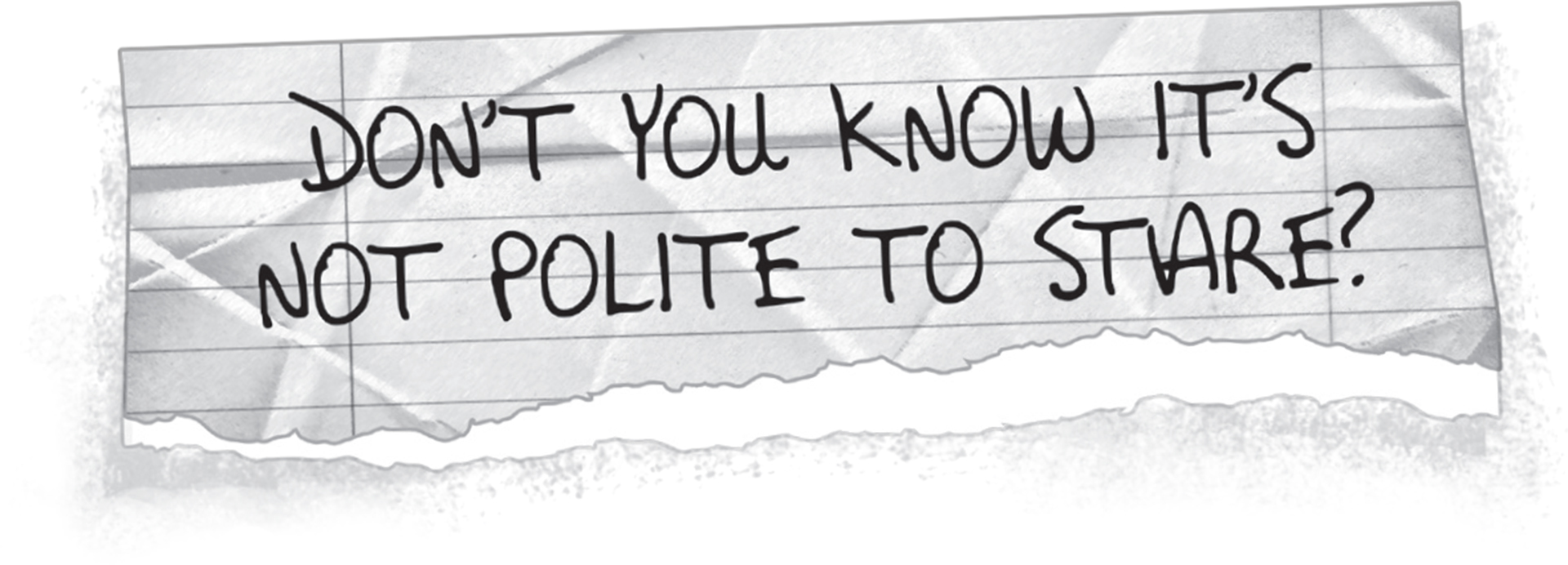
He heard me talking to the cat.
I take my hand from the window and back up a little, looking for the string to pull the shade. Before I find it, though, the kid drops the note and flickers his light to get my attention. Then he slaps another note to the window.
Then he smiles.
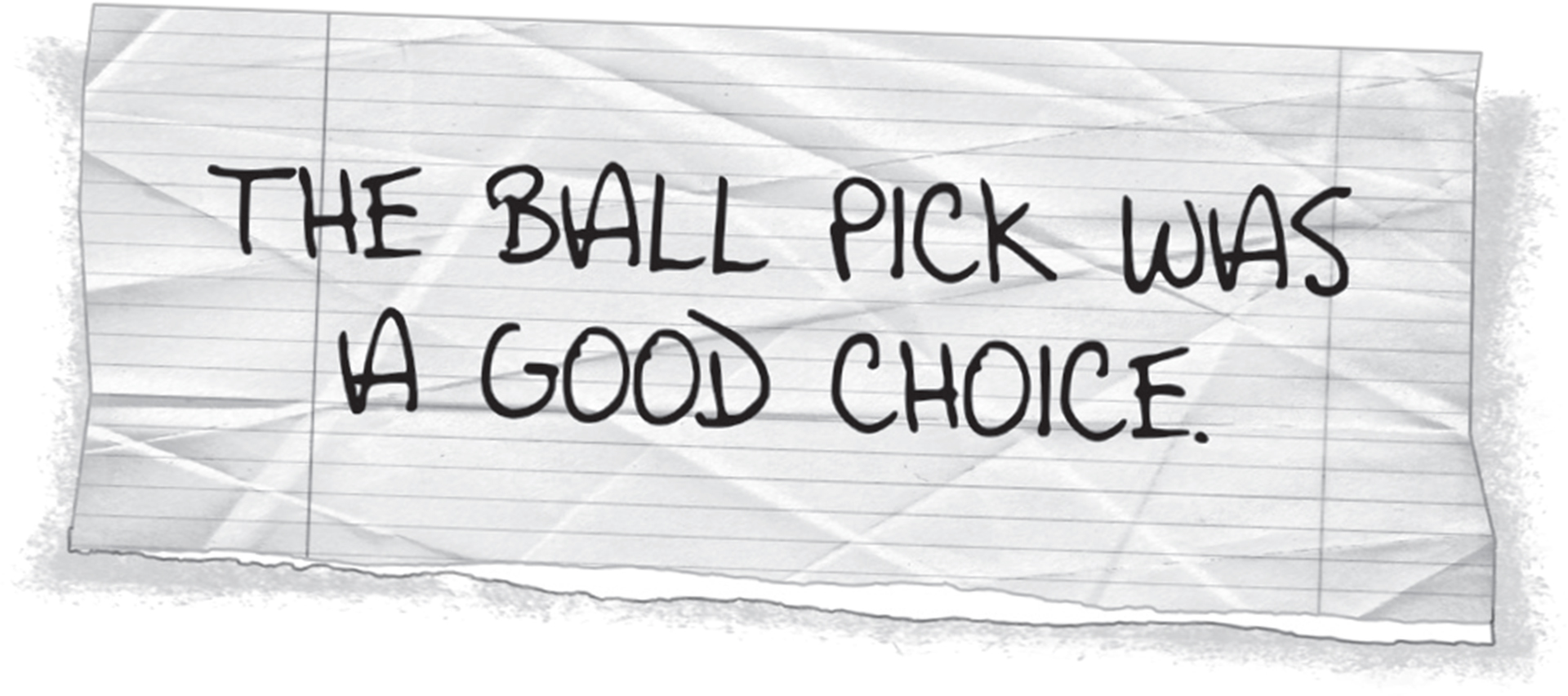
I look down at my kit and the knot of locks, feeling found out, but instead of being embarrassed, I feel … relieved.
I rummage for a piece of paper and a marker we’d been using to label boxes. I think for a second, then hold my flashlight up to my own message.
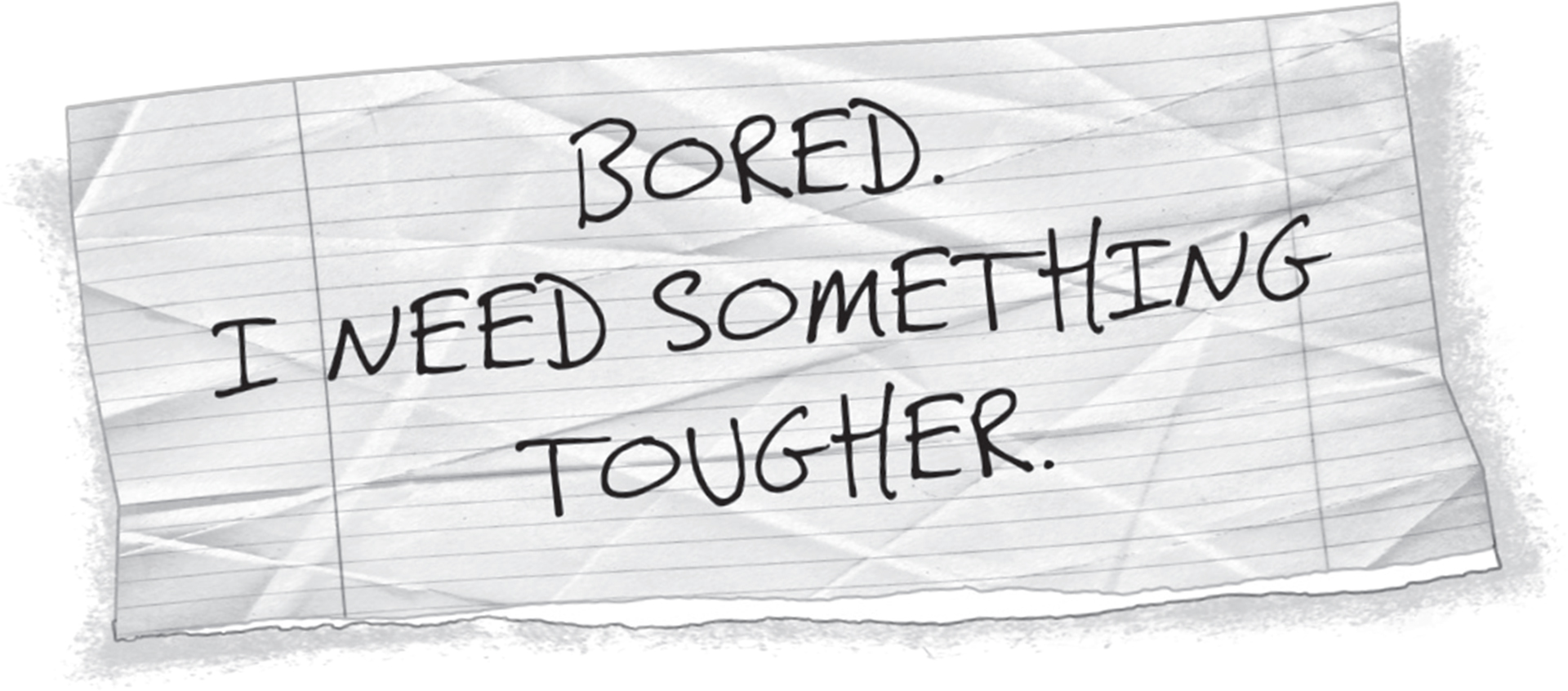
The kid smiles, and he ducks his head, showing me a full head of lightning-white hair, then holds up a new sheet.
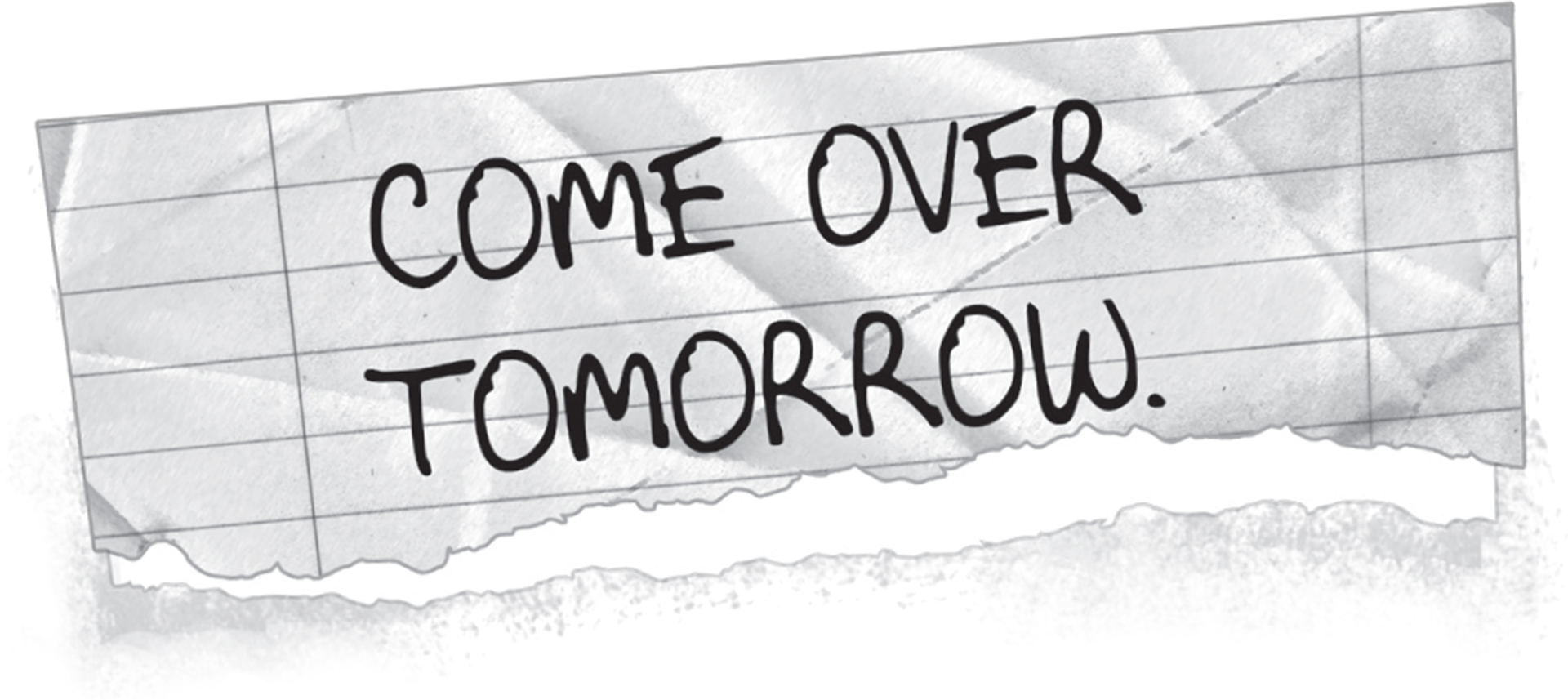
I nod, and he draws his curtain closed, leaving me standing there with my flashlight in one hand and a marker in the other. I stare at the house across the street, which is definitely bigger than ours but I’m not sure I’d call it nicer. From the chipped paint on the porch to the cracked driveway to the gutters separating at the seams, everything looks like it’s in need of repair. Upon closer look, there’s a little half door on the side of the house that looks like it might lead to a root cellar, but it’s impossible to say because if it is a door, it’s covered over with so many wooden boards and bent nails, there’s no way it could ever open. If that weren’t enough, metal padlocks gleam from hinges between the wooden boards, daring someone to try to gain entry. Overkill doesn’t even begin to cover it.
I shake my head and go back to bed, staring up at the ceiling, the sound of my dad’s words swirling around in my brain.
Raven Brooks will be your city.
Maybe it will be. There’s the windowsill like a bench and a kid across the street who knows the difference between a half-diamond and a ball pick. There’s a newspaper that everyone still subscribes to, and a university where Mom’s giant science brain is needed.
I’m almost asleep again before I remember why I was looking out the window in the first place. I settle into an uneasy sleep with the memory of a scream that no one but me seemed to hear.